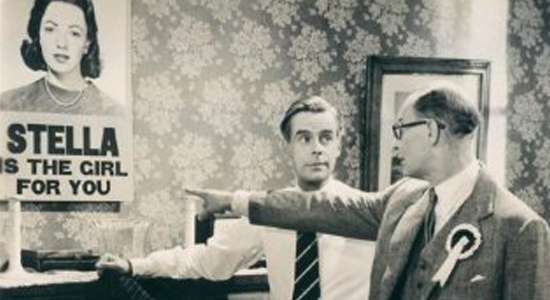MAGNET contributing writer Jud Cost is sharing some of the wealth of classic films he’s been lucky enough to see over the past 40 years. Trolling the backwaters of cinema, he has worked up a list of more than 500 titles—from the silent era through the ’90s—that you may have missed. A new selection, all currently available on DVD, appears every week.

Left Right & Centre (1959, 95 minutes)
British film comedies from its mid-’50s to mid-’60s Golden Era usually featured at least one of a brilliant revolving cast of comic actors that included Ian Carmichael, Terry-Thomas, Peter Sellers and Alastair Sim. They were frequently directed/produced by such luminaries as Frank Launder, Sidney Gilliat and the Boulting brothers, John and Roy. You’d be hard-pressed to find an example of this genre that didn’t feature at least one of these.
Left Right & Centre is fortunate enough to have four. Bobby Wilcot (Carmichael) is an empty-headed game-show TV personality, just vain enough to think he has the right stuff to run for the House of Commons on the Conservative ticket, naturally. After all, he is the nephew of Lord Wilcot (Sim), owner of a large country estate near the seat the younger man has targeted in Earndale.
As the screen shows a brick wall with a neat piece of Elizabethan graffiti (“A plague o’ both your houses”), a narrator’s somber tone describes English politics most succinctly. “Every nation, they say, gets the government it deserves. With the House of Commons, one might sum up the enormous differences between its two major political parties by saying, with the Conservatives it’s the exploitation of man by man. And with the Socialists, it is exactly the other way round.” And woman, too, we might add, a notion whose time had finally come by the end of the ’50s.
The Socialists, otherwise known as the Labour party, have selected a young lady named Stella Stoker (Patricia Bredin) to run against Wilcot in the upcoming by-election, meaning the seat is currently vacant. Earndale’s residents are described by the narrator as “intelligent, serious-minded citizens, for are they not the inheritors of 3,000 years of civilization and culture?” This as a gum-chewing young couple enters Earndale’s cinema with a garish poster outside depicting an eight-legged creature about to have its way with a scantily clad spacegirl to advertise its current feature, Spider Man From Mars.
Before taking the train to Earndale, Stella bids adieu to her dad, a local fishmonger, who professes shock that any daughter of his would enter the political arena. “We’ve always been thought of as a respectable family,” he says. Stella is hoisted upon a barrel to give a parting speech. “I can’t promise I’ll win,” she says earnestly, “but I’ll give it a jolly good try.” Once on the train, as luck would have it, she’s seated opposite Bob Wilcot, her worthy opponent. Clueless as ever, Wilcot reveals he’s only been to Earndale one or two times and that he’s running against “some blue-stockinged battle-axe.” By the time the train arrives in Earndale, Stella has Wilcot carrying her luggage onto the platform, a fact the local paparazzi are only too happy to memorialize for tomorrow’s front page.






